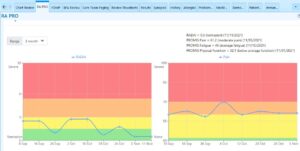After several years, various iterations, and funding from the Rheumatology Research Foundation, the mobile health PRO app (mPRO) was integrated into the EHR, Epic. Before pursuing this integration, rheumatologists provided advice on how to integrate the PRO data into clinical decision making. This helped decide on how to display the data (see Figure 1), as well as processing the data to provide behavioral nudges to providers.
mPRO digests the information and lets the responsible clinician know when to consider dynamically rescheduling a patient: If patient-reported symptoms are stable, the app suggests delaying the visit; and if the patient’s symptoms are worsening, the app suggests an early visit. These messages are delivered as secure emails within the EHR.
Over a recent one-year study with 150 RA patients, we observed that the delay visit email was triggered 108 times across almost 443 scheduled visits (24%).8 This suggests that there are a lot of visits for patients with stable PROs. Approximately 20% of delay visit emails resulted in actual delayed visits. The ability to dynamically reschedule stable patients, delaying appointments, could help practices reduce their wait times.
The PRO app is narrowly focused on improving access through dynamic rescheduling, but it serves several other important functions.
First, the continuous collection of PRO data is important to fulfill the goal of treating to target. Access to PRO data between visits means that management decisions can be evidence based with enhanced patient involvement. The PRO data can also be used for value-based care reporting with health plan payers. In fact, the application can support a practice’s participation with Medicare’s MIPS Advancing Rheumatology Care Value Pathway.
Second, the PRO app allows patients to input their rheumatology drugs, reminder times for drug administration, and reasons if dosages were missed. This information, alongside the PRO data, allows practices to participate in remote therapeutic monitoring (RTM). RTM is billable under a relatively new set of CPT codes that encourages more remote care. Although there is little experience with RTM in rheumatology, these billing codes are being used in other areas of medicine.
Further, for qualifying patients, remote capture of PROs can also be used to generate disease-specific data that contributes to chronic care management (CCM). Specifically, PRO data can contribute directly to the development of measurable treatment goals, assessment of symptom management and the periodic review requirements of the comprehensive care plan.



